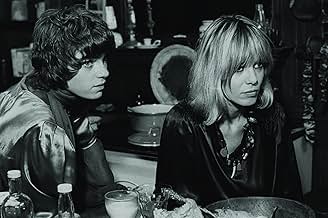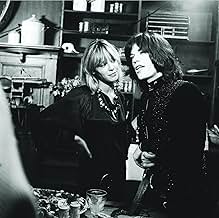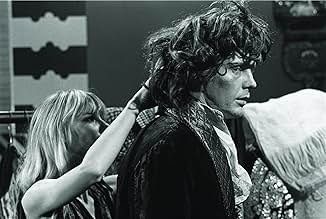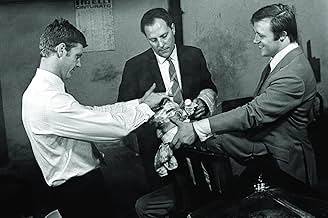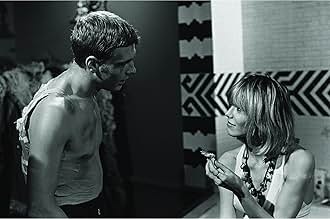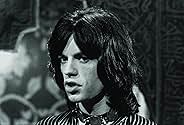A violent East London gangster undergoes a transformation of identity while hiding from his former colleagues in the home of a jaded Bohemian rock star and his two girlfriends.A violent East London gangster undergoes a transformation of identity while hiding from his former colleagues in the home of a jaded Bohemian rock star and his two girlfriends.A violent East London gangster undergoes a transformation of identity while hiding from his former colleagues in the home of a jaded Bohemian rock star and his two girlfriends.
- Nominated for 1 BAFTA Award
- 1 nomination total
Michèle Breton
- Lucy
- (as Michele Breton)
Anthony Morton
- Dennis
- (as Antony Morton)
Kenneth Colley
- Tony Farrell
- (as Ken Colley)
Edmond Bennett
- Detective Sergeant
- (uncredited)
Helen Booth
- Noel's mum
- (uncredited)
John Caesar
- Ticket Clerk
- (uncredited)
Jay Denyer
- Constable
- (uncredited)
- Directors
- Writer
- All cast & crew
- Production, box office & more at IMDbPro
Featured reviews
Gangland enforcer James Fox gets involved with decadent fading rock star Mick Jagger in Nicholas Roeg's and Donald Cammell's cult film
Few films encapsulate drug-crazed Swinging 60s London like this one, though it was only seen three years after it was made and then heavily-edited because Warners were shocked at what they had financed. The film exceeded the boundaries of good taste that always epitomized British cinema.
This superbly shot, deeply disturbing, complex, often pretentious, often brilliant parable of confused identity was the first feature directed by leading cinematographer Roeg, sharing the credit with artist Cammell.
An eerily plausible Fox, cast against type, plays Chas, a sadistic gangster on the run who rents a room in the Notting Hill Gate home of Turner (Jagger), a reclusive, sexually ambiguous, washed-up rock star. Fox, his antithesis, is offered women and magic mushrooms before literally swapping personalities with the singer.
Fox abandoned the cinema for almost a decade after this film, such was its effect on him.
Verdict A dazzling, ideas-rich, extraordinarily inventive full-stop to the 60s
Few films encapsulate drug-crazed Swinging 60s London like this one, though it was only seen three years after it was made and then heavily-edited because Warners were shocked at what they had financed. The film exceeded the boundaries of good taste that always epitomized British cinema.
This superbly shot, deeply disturbing, complex, often pretentious, often brilliant parable of confused identity was the first feature directed by leading cinematographer Roeg, sharing the credit with artist Cammell.
An eerily plausible Fox, cast against type, plays Chas, a sadistic gangster on the run who rents a room in the Notting Hill Gate home of Turner (Jagger), a reclusive, sexually ambiguous, washed-up rock star. Fox, his antithesis, is offered women and magic mushrooms before literally swapping personalities with the singer.
Fox abandoned the cinema for almost a decade after this film, such was its effect on him.
Verdict A dazzling, ideas-rich, extraordinarily inventive full-stop to the 60s
Visually compelling and disturbing look at two diverse sides of 1960s London; the criminal underworld and hippie culture, respectively symbolised by Fox's Chas, the wayward gangster, and Jagger's Turner, a semi-retired bisexual rock musician.
It's Chas' world we are first introduced to during a highly charged furiously paced scene of gangland violence. It soon becomes clear to us that he is not only an outcast to society but also dangerously individual within his own mob circle. On the run from both the law and the mob he takes refuge in a Notting Hill home which he finds is occupied by Turner, his junkie girlfriend, Pherber, and her French lover, Lucy. Tunrer becomes infatuated with Chas' violent charisma and his "vital energy" he himself feels he has lost.
As the title suggests the film is all about performances. Chas is initiated into Turner's underground world of drug experimentation and gender bending. Turner's name in itself is symbolic of the way he tries to play with and turn Chas' psyche around. It is ultimately the "performance" of Turner which brings the two worlds together, as he poses as Chas' mobster boss, Harry Flowers, in a scene shot similarly to a modern day music video.
Some critics had felt the film lost its way once Chas entered Turner's world. Yet surely such disorientation is indicative of how the film successfully explores Chas' own uneasiness in confronting his own subconscious in an alien atmosphere. The film is full of visual flourishes as one might expect from Roeg, who had been cinemaphotographer on films such as 'Fahrenheit 451'. Fox is mesmerising playing out the evolving identities of Chas, whilst Jagger's persona is exhibited to its full potential. Roeg was again to explore the theme of alienation using a rock star (this time David Bowie) in a more literal sense in his landmark science fiction film 'The Man Who Fell To Earth'.
It's Chas' world we are first introduced to during a highly charged furiously paced scene of gangland violence. It soon becomes clear to us that he is not only an outcast to society but also dangerously individual within his own mob circle. On the run from both the law and the mob he takes refuge in a Notting Hill home which he finds is occupied by Turner, his junkie girlfriend, Pherber, and her French lover, Lucy. Tunrer becomes infatuated with Chas' violent charisma and his "vital energy" he himself feels he has lost.
As the title suggests the film is all about performances. Chas is initiated into Turner's underground world of drug experimentation and gender bending. Turner's name in itself is symbolic of the way he tries to play with and turn Chas' psyche around. It is ultimately the "performance" of Turner which brings the two worlds together, as he poses as Chas' mobster boss, Harry Flowers, in a scene shot similarly to a modern day music video.
Some critics had felt the film lost its way once Chas entered Turner's world. Yet surely such disorientation is indicative of how the film successfully explores Chas' own uneasiness in confronting his own subconscious in an alien atmosphere. The film is full of visual flourishes as one might expect from Roeg, who had been cinemaphotographer on films such as 'Fahrenheit 451'. Fox is mesmerising playing out the evolving identities of Chas, whilst Jagger's persona is exhibited to its full potential. Roeg was again to explore the theme of alienation using a rock star (this time David Bowie) in a more literal sense in his landmark science fiction film 'The Man Who Fell To Earth'.
This is probably one of the best cult movies ever made. I have seen it about 20 times now and even the last time, it was still not boring and I stayed up late again to watch it at 3 in the morning (even though I have it on video). "Performance" shows James Fox in a part you would never expect from him. The mobster with the secret past and deep dark secrets. Violent and with a "no mercy" attitude. Very impressive. Mick Jagger debuts as an actor in this picture and you can see he wants to do well in the beginning. I know the movie was shot chronologically and Jagger seems to be growing as an actor in each scene. The most impressive performance is the performance German/Italian actress Anita Pallenberg is giving here. As the Jagger's character says in the movie: "The only performance that makes it, that really makes it, that makes it all the way, is the one that achieves madness!" And Anita does just that. She is beautiful, decadent, dangerous, high and grounded and very much herself as Pherber. If you watch this movie, you should really try and focus on her, because she is full of surprises. French teen actress Michèle Breton only starred in this movie and the attention is drawn away from her completely by Pallenberg. That is a shame, because Breton does have some very strong scenes, like the one with Pallenberg when they are talking about the gangster. You can see that both Breton and her character are not sure what they are yet: are they children or young women? This movie clearly deserves 10 out of 10!
It doesnt really matter whether you like the Rolling Stones or not, but it may help if you know about the late sixties drug busts,the demise of Brian Jones,the Vietnam war,the Black Panther party,and the end of the flower power dream.Nic roeg and Donald Cammell sure did when they decided to make this film.Like a shattered kaliedoscope you cant put down it resonates long after the credits have rolled.Jagger plays a washed up rockstar trying to get back into contact with his muse-in fact any muse.Fox, plays a brutal gangster on the run looking only for somewhere to hide.Some things in this film have dated but the vast majority of it stands the test of time.Shelved by Warner Brothers on first release,it now stands as a proud monument to maverick film making which has never been bettered.
Reading the various comments posted, I'm saddened to see that Nic Roeg is receiving the credit for this amazing film. Granted, Roeg did provide his always stunning camera work to the film, but it was Donald Cammell who wrote, directed the actors, and edited (along with Frank Mazzola) PERFORMANCE.
Roeg acted as DP on the film, blocking the camera movements as Cammell worked with the actors. In fact, according to Cammell, they worked so well together that people would comment "...the two director approach is the wave of the future." Cammell also revealed that his admiration for Roeg's work was somewhat tempered by the fact that Roeg was often solely credited for PERFORMANCE, something that just isn't true.
Don't get me wrong, I think Nic Roeg is a wonderful director and a brilliant DP. DON'T LOOK NOW, THE MAN WHO FELL TO EARTH, and BAD TIMING are some of my favorite films, but PERFORMANCE is Cammell's vision more than Roeg's.
In fact, given the ironic and tragic life that Cammell led, perhaps it's only fitting that he would be overlooked for his work on PERFORMANCE, which displays his obsessions for Borges, gender/identity, and sexuality.
Any interest? Seek out DONALD CAMMELL: THE ULTIMATE PERFORMANCE for a fascinating look at this brilliant artist.
Roeg acted as DP on the film, blocking the camera movements as Cammell worked with the actors. In fact, according to Cammell, they worked so well together that people would comment "...the two director approach is the wave of the future." Cammell also revealed that his admiration for Roeg's work was somewhat tempered by the fact that Roeg was often solely credited for PERFORMANCE, something that just isn't true.
Don't get me wrong, I think Nic Roeg is a wonderful director and a brilliant DP. DON'T LOOK NOW, THE MAN WHO FELL TO EARTH, and BAD TIMING are some of my favorite films, but PERFORMANCE is Cammell's vision more than Roeg's.
In fact, given the ironic and tragic life that Cammell led, perhaps it's only fitting that he would be overlooked for his work on PERFORMANCE, which displays his obsessions for Borges, gender/identity, and sexuality.
Any interest? Seek out DONALD CAMMELL: THE ULTIMATE PERFORMANCE for a fascinating look at this brilliant artist.
Did you know
- TriviaAccording to Anita Pallenberg, one scene actually shows her shooting heroin, which she was just starting to get into at the time.
- Alternate versionsIn most versions the voices of Johnny Shannon, John Bindon and Laraine Wickens have been overdubbed. This was because the actors' own voices were thought to be "too cockney" for non-UK audiences to understand. The 2007 Region 2 DVD (DY11687) features the voices of all three actors throughout the feature, none of the previous overdubs are present in this version.
- ConnectionsFeatured in Memo from Turner (1970)
- How long is Performance?Powered by Alexa
Details
Box office
- Budget
- £750,000 (estimated)
- Gross worldwide
- $93,367
- Runtime
- 1h 45m(105 min)
- Color
- Sound mix
- Aspect ratio
- 1.85 : 1
Contribute to this page
Suggest an edit or add missing content


